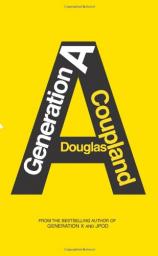Generation A
Review
Generation A
It’s hard to say if GENERATION A is more simplistic,
stodgy grumbling or sophisticated social satire. Blaming the
Internet and smart-phones for shorter attention spans and decreased
social intimacy feels a little old. But Douglas Coupland’s
polyphonic narrative, curious world-building and bizarre twist
endings take this novel in interesting directions worth exploring.
The book puts a new spin on the way our world has changed and the
consequences of greedily --- and perhaps mindlessly --- devouring
new technologies. And in a world where “social” is a
prefix attached to everything now (-media, -marketing, -publishing,
etc.), why are we so lonely?
In the near future, there’s a new over-the-counter drug on
the market called Solon, an anti-anxiety medication that eliminates
a consumer’s sense of time and eases them into a comforting
--- and extremely isolating --- present. The world is faced with
plant species dying out without the bees to pollinate them and the
breakdown of social relationships everywhere as Solon users become
increasingly withdrawn from society.
Five relatively young adults from around the planet (Iowa, New
Zealand, Sri Lanka, Paris and Canada) give their accounts of
socially isolating lives in a world that is theoretically
ultra-conducive to socialization. Their loneliness --- more
aloneness, really --- is brought out just enough to make the point,
but not to interfere with Coupland’s wry wit. An emotionally
overwrought novel this is not. Their lives are quiet and full of
desperation until they are each stung by a bee and immediately
swept away by agents in biohazard suits to hidden labs to undergo
endless testing. Imprisoned for weeks in rooms designed to elicit
no emotional reactions (notably by the removal of media and brand
names), they must ponder an even deeper isolation until they are
released.
The second act of the novel portrays them trying to fit
back into their lives, though their anonymity has been shattered by
their newfound celebrity. Some take it better than others (the
Iowan Zack is knee-deep in Playboy bunny-esque girls infatuated
with him for getting stung; Harj, a Sri Lankan customer service
representative for Abercrombie & Fitch is embraced by the
cherubic preps he calls “Craigs” who work at the
company headquarters), but all of them struggle with yet another
kind of aloneness as their lives can never be what they once were,
and they start to yearn for each other. Despite never meeting in
their neutrality rooms, they quickly learned about each other
through the prompt international media storm, and their shared
experience draws them together.
They’re allowed to meet when abducted once again to an
island removed from civilization, forced to tell each other stories
around a campfire by the scientist behind their kidnapping. He
hopes that telling stories will put his subjects in the right mood
to produce specific “microproteins” (don’t try to
unpack the sketchy neuroscience-fiction; just run with it), which
have some connection with Solon and the near-extinction of bees.
Through their mostly grim stories --- as telling of the anxieties
and spurned desires of this age group as anything you’re
likely to come across --- the five learn their role in a larger
conspiracy and begin to connect the dots about the world around
them. The narrative here is mostly stories-within-stories and big
reveals, and while it feels like Coupland is just rushing to spit
out everything he wants to say, it’s necessary rushing after
a first act of sly allusions and only mild barbs.
Coupland’s shorter witticisms make some of the best
reading in GENERATION A. Zack’s rant against Monsanto and the
U.S.’s sickening relationship with corn --- “buttery
carb dildos” as he puts it --- is delightful reading. One of
Harj’s offhand comments eloquently punctures one of the
decade’s greatest myths of our living in an equitable global
village: “Could I ever be a Craig? No. A person must be born
into Craigdom, with its multiple ski holidays, complex orthodontia,
proper nutrition and casual, healthy view of recreational
sex.” The stories --- more like fables, really --- that the
five tell, though brief, are penetrating probes into our modern
world.
Coupland’s greater themes get spottier. While his damning
of 21st-century hyper-communication is relatively coherent, his
metaphors feel a little confused. The role of Solon in his critique
isn’t as clear as it needs to be, and its relationship to
technology-overloaded isolationism is too cloudy to act as a
concise abstraction of a complicated issue. His rendering of our
society’s addiction to techno-social innovations (Twitter et
al are clearly in his sights) is sharp and sobering, but his
criticisms of new technologies on the whole as a devil’s path
that leads to complete degenerate idiocy is overly simplistic.
Also, his defense of some golden age of book-reading feels hollow.
For as much as our attention spans have shortened and our
petulant demands for constant content whenever and however we want
it have increased, there are genuine benefits in our Web
2.0-powered world (this website, for one). Coupland’s
argument isn’t sophisticated enough for 2009. Fortunately, he
fares much better at capturing the mindset of a generation: smart
but innocent babes in a Garden of Eden (to paraphrase from
Vonnegut’s epigraph) incapable of properly analyzing their
world’s complexity.
But for all the novel’s faults, be they intellectual or
artistic, GENERATION A is a quick, funny and earnest read. Though
Coupland misses the mark, its passion is infectious. And I
can’t criticize a smart, witty novel that doubles as an
impassioned defense of reading novels too harshly.
Reviewed by Max Falkowitz on January 22, 2011
Generation A
- Publication Date: November 10, 2009
- Genres: Fiction
- Hardcover: 320 pages
- Publisher: Scribner
- ISBN-10: 1439157014
- ISBN-13: 9781439157015




